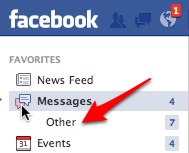Let’s clear up the confusion about Facebook email changes, which seem to make everyone’s default mail a @Facebook.com email address.
Lifehacker does a good job explaining how to change it back, or make it private, and Forbes blogger Kashmir Hill called Facebook’s move a “lame attempt to force its email service on you.”
According to Facebook’s help
By default, anyone on Facebook can send you a message, and anyone outside of Facebook can email you at your “username@facebook.com.” Messages and email all go to your Facebook Messages.
To edit who can message you, simply:
1. Click the account menu  at the top right of any Facebook page and choose Privacy Settings.
2. Next to the How You Connect heading, click Edit Settings.
3. Select your preference from the dropdown menu next to Who can send you Facebook messages?
My friend Dean Collins did a quick test and found that I got his mail, but he and I are connected on Facebook. So, assuming he used an email associated with his account, it is not unusual that this would work.
For the real testing, Christopher Penn at email provider What Counts did a test of deliverability of Facebook.com email addresses.
He provides a great visual/chart to help you out. His conclusion:
Clearly, Facebook has some very odd, inconsistent rules when filtering email, and unlike other mail server systems, it doesn’t seem to return any messages when things do or don’t bounce.
He also gives advice to marketers that Facebook.com email addresses aren’t optimal – perhaps a benefit to consumers who don’t want to be bothered. Marketers may see more of these, and have no insight on their deliverability. Definitely a downside for consumers who ask for and want information.
If you think that you should be receiving a message on Facebook and it is not showing in your regular message box, don’t forget about the “Other” box where those ‘suspect’ messages go. 

